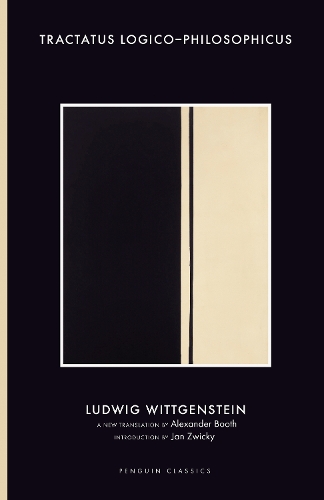
Tractatus Logico-Philosophicus
(Hardback)
Available Formats
Paperback, 471st ed.
Published: 12th January 1998
Hardback
Published: 26th March 2024
Paperback, Customer-Specific
Published: 1st December 2003
Hardback
Published: 11th May 2021
Paperback
Published: 11th May 2021
Paperback
Published: 4th March 2025
Publishing Details
Tractatus Logico-Philosophicus
By (Author) Ludwig Wittgenstein
Translated by Alexander Booth
Introduction by Jan Zwicky
Penguin Books Ltd
Penguin Classics
26th March 2024
7th December 2023
United Kingdom
Classifications
General
Non Fiction
Philosophy of language
Philosophy: logic
Philosophy: metaphysics and ontology
192
Physical Properties
Hardback
144
Width 136mm, Height 200mm, Spine 20mm
240g
Description
One of the greatest philosophical works of all time, in a new translation for the twenty-first century Widely regarded as one of the most influential philosophical works of the twentieth century, Ludwig Wittgenstein's Tractatus Logico-Philosophicus is a succinct yet wide-ranging exploration of language and logic, science and mysticism, which has inspired generations of thinkers, artists and poets. In a series of short, bold statements, Wittgenstein seeks to define the limits of language, its relation to logic, its power and its inherent failings. Originally published in the early 1920s, it is the only book-length work the renowned philosopher published in his lifetime. In this thrilling new translation, Alexander Booth displays an extraordinary sensitivity to the subtle influence on Wittgenstein's gem-like prose - at once specialist and, often, remarkably plain-spoken - of his background in mechanical engineering, while highlighting the underlying poetry of this seminal text.
Author Bio
Ludwig Josef Johann Wittgenstein was born in Vienna in 1889 to a wealthy industrialist family and pursued an education in mechanical engineering before going on to study, and later to teach at the University of Cambridge, where he lived until his death in 1951. He is regarded by many as the greatest philosopher of the twentieth century, and his two major works, the Tractatus Logico-Philosophicus (1921) and Philosophical Investigations (published posthumously in 1953), are two of the most influential works within the history of the analytic tradition.
